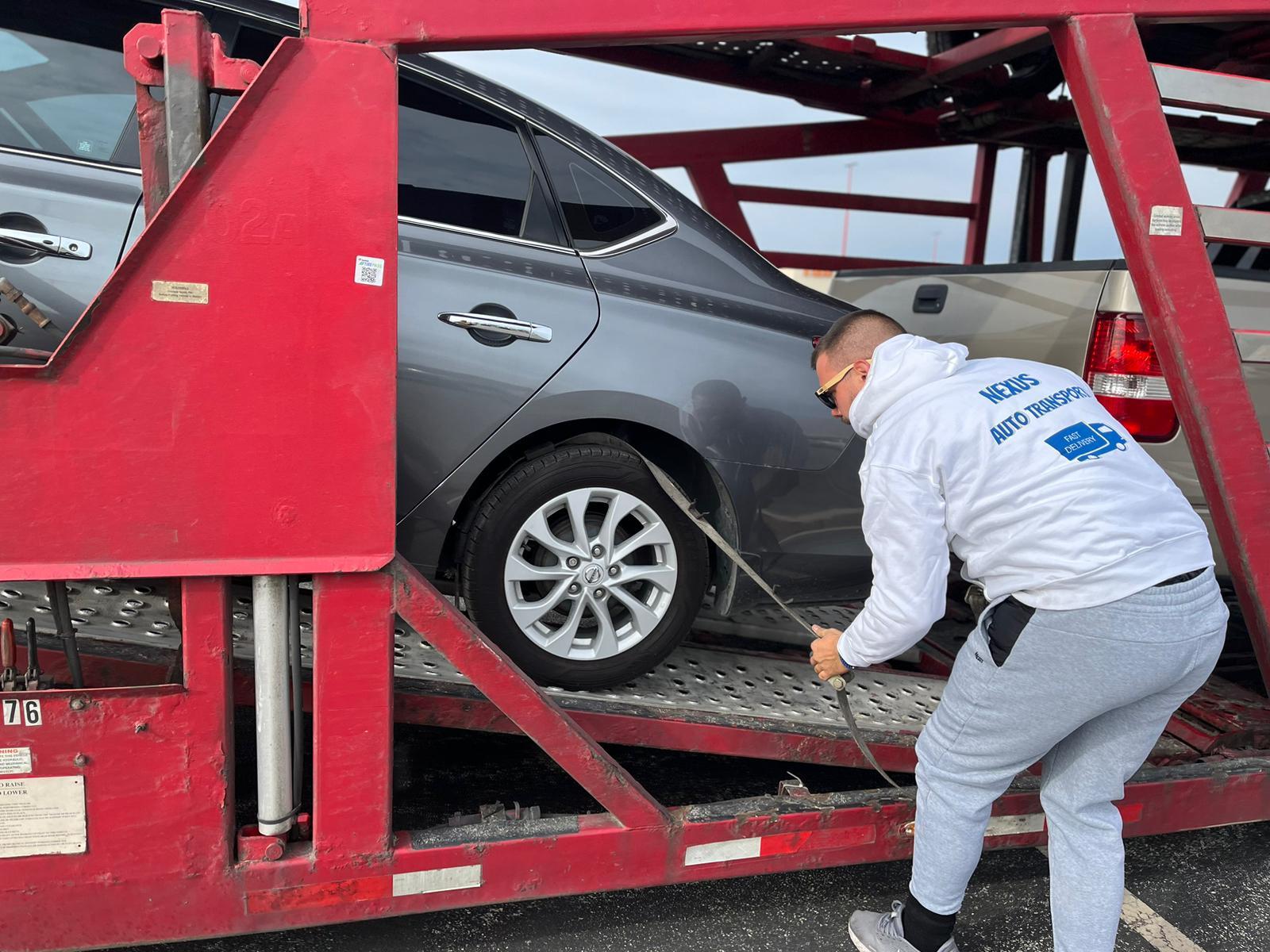If you’re planning to transport a vehicle, one of the first decisions you’ll need to make is whether to use open or enclosed transport. Both options are safe and widely used, but they serve different needs depending on your vehicle, budget, and expectations.
At Nexus Auto Transport, we believe informed customers make better decisions. This guide clearly explains the difference between open and enclosed shipping, outlines when to choose each option, and helps you determine which method is right for your situation.
What Is Enclosed Car Shipping?
Enclosed car shipping is a vehicle transport method where your car is moved inside a fully covered trailer, protecting it from weather, road debris, and outside exposure during transit.
This option is most commonly used for:
Luxury and exotic vehicles
Classic and antique cars
Custom or modified vehicles
High-value or collectible automobiles
Because enclosed carriers transport fewer vehicles at a time, they allow for greater care, reduced handling, and added security.
Is Enclosed Auto Transport Worth It?
For vehicles that require maximum protection, enclosed transport is often the best choice. Many enclosed trailers carry only one to five vehicles, which reduces loading cycles and minimizes risk.
If your vehicle is irreplaceable, highly valuable, or in pristine condition, the added cost is often justified by the peace of mind and protection it provides.
Pros and Cons of Enclosed Auto Transport
Advantages
Complete protection from rain, snow, sun, and road debris
Increased security and privacy
Ideal for rare, luxury, or show vehicles
Experienced drivers trained in high-value vehicle handling
Disadvantages
Higher cost compared to open transport
Fewer carriers available, which can impact scheduling
Bottom line: Enclosed transport is the safest option when vehicle condition matters more than price.
What Is Open Auto Transport?
Open car shipping is the most common and cost-effective way to transport vehicles. Cars are loaded onto an open-air trailer, similar to the carriers used by dealerships and manufacturers nationwide.
This method is ideal for standard vehicles and everyday drivers and is widely used across the industry.
Is Open Auto Transport Safe?
Yes. While vehicles are exposed to the elements, serious damage is uncommon. Open transport has a long track record of reliability and is the preferred option for most customers who need to ship a car to another state without unnecessary expense.
Minor exposure to dust or weather is possible, but this is typically no different from normal driving conditions.
Pros and Cons of Open Auto Transport
Advantages
Most affordable shipping option
Widely available with faster pickup times
Ideal for daily drivers and standard vehicles
Flexible scheduling nationwide
Disadvantages
Exposure to weather and road conditions
Less privacy compared to enclosed transport
Bottom line: Open transport offers the best balance of price and reliability for most vehicles.
Open vs. Enclosed Car Shipping: Comparison Table
Feature | Open Auto Transport | Enclosed Auto Transport |
Cost | Lower | Higher |
Protection Level | Moderate | Maximum |
Weather Exposure | Yes | No |
Carrier Availability | Very high | Limited |
Best For | Standard vehicles | Luxury, classic, exotic cars |
Delivery Speed | Faster scheduling | May take longer |
Industry Usage | Most common | Specialized |
When to Choose Open Auto Transport
Choose open transport if:
Your vehicle is a standard sedan, SUV, or truck
Budget is a primary concern
Minor exposure to weather is acceptable
You want faster scheduling and flexibility
This option is especially popular for cross country car shipping due to availability and affordability.
When to Choose Enclosed Auto Transport
Choose enclosed transport if:
Your vehicle is high-value or collectible
You want full protection from the elements
The car has custom paint or modifications
Maximum security and peace of mind matter most
This method is commonly selected by customers transporting rare or high-end vehicles.
Choosing the Right Auto Transport Company
No matter which option you select, working with a reputable auto transport company makes all the difference. Experienced carriers use professional loading techniques, proper securing systems, and fully insured transport to protect your vehicle from pickup to delivery.
Many customers rely on professional car shipping services when relocating, purchasing remotely, or buying car online from another state to avoid unnecessary mileage and wear.
Final Thoughts
Both open and enclosed transport are reliable ways to move your vehicle. The right choice depends on your priorities: cost, protection, and timing. Understanding these differences allows you to make a confident, informed decision that fits your needs.
At Nexus Auto Transport, our goal is to provide honest guidance and dependable solutions—so your vehicle arrives safely, on time, and without surprises.
Frequently Asked Questions About Open vs Enclosed Car Shipping
What is the main difference between open vs enclosed car shipping?
The primary difference is protection. Open transport moves vehicles on uncovered trailers, while enclosed transport places vehicles inside fully covered trailers. Open transport is more affordable and widely available, while enclosed transport offers maximum protection for high-value vehicles.
Is enclosed auto transport safer than open transport?
Yes, enclosed transport provides a higher level of protection because vehicles are shielded from weather, road debris, and public exposure. However, open transport is still considered safe and is used for the majority of vehicle shipments nationwide with very low risk of serious damage.
How much more does enclosed auto transport cost?
Enclosed transport typically costs 30% to 60% more than open transport. The higher price reflects increased protection, fewer vehicles per trailer, specialized equipment, and limited carrier availability.
How long does vehicle shipping take?
Transit time depends on distance, route, and carrier availability. Most shipments take anywhere from a few days to one week for long-distance moves. Open transport often allows for faster scheduling due to higher availability.
Will my car be exposed to weather during transport?
With open transport, vehicles are exposed to natural conditions such as rain, sun, or dust, similar to everyday driving. With enclosed transport, vehicles remain fully protected from all external elements for the entire journey.
Are vehicles insured during transport?
Yes. All professional vehicle carriers are required to carry insurance coverage. At Nexus Auto Transport, every shipment is handled by fully insured carriers, and coverage details are provided before booking so there are no surprises.
Can I ship an inoperable vehicle?
Yes, non-running vehicles can be shipped, but special equipment such as winches may be required. Availability and cost may vary depending on the carrier and transport method.
Is open transport safe for new or leased vehicles?
Yes. Open transport is commonly used by manufacturers and dealerships to deliver brand-new vehicles. While enclosed transport offers additional protection, open transport is still a reliable option for new and leased cars.
How do I prepare my car for shipping?
Before transport, remove personal items, wash the vehicle to document its condition, check for leaks, disable alarms, and ensure the fuel tank is about one-quarter full. The driver will complete a condition report at pickup and delivery.
Which transport option is best for long-distance moves?
Both options work well for long-distance shipping. Open transport is the most common choice due to cost and availability, while enclosed transport is preferred when the vehicle’s condition or value requires added protection.
How do I choose the right transport option for my vehicle?
Consider your vehicle’s value, condition, budget, and how much protection you want. If affordability and speed are priorities, open transport is ideal. If protection and peace of mind matter most, enclosed transport is the better choice.



